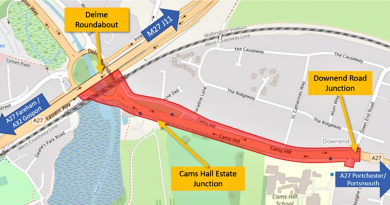NHS issues guidance for high summer temperatures
NHS HAMPSHIRE & IOW have released official guidance for residents about dealing with the impacts of serious heat following warm sunny weather in recent weeks; which has seen temperatures above thirty-two degrees for the region across three separate heatwaves and has seen an increase in people using medical services as a result.
It is well documented that higher temperatures can cause or worsen health issues for different people; including the elderly, the very young and those with pre-existing medical conditions. Recent weeks have seen residents across the region being treated with heat exhaustion and heatstroke, which are the most common issues during summer months.
There are many signs of heat exhaustion including tiredness, dizziness, headaches, feeling sick / being sick, cramps, fast breathing/ heartbeat, a high temperature, being very thirsty, and weakness. In young children it may also include being very lethargic or floppy, which can occur at any point and people are asked to check on others who are vulnerable.
Heat exhaustion isn’t normally serious and people should return to their usual self within thirty minutes of cooling down. If somebody is struggling, they should be moved to a cool place and all unnecessary clothing (like socks / jackets) must be removed; whilst cool water can be drunk and further used for the skin in the neck / armpit areas.
But if symptoms of heat exhaustion are left untreated, it can quickly lead to heatstroke and people are asked to call 999 for immediate assistance if they notice the signs. These cover high body temperatures over forty degrees, seizures / fits, loss of consciousness, hot skin without sweat, confusion / lack of co-ordination and a fast heartbeat, breathing or shortness of breath.
People should also phone 999 if somebody is still feeling unwell after thirty minutes of resting in a cool place and drinking cool fluids as this is another symptom of heatstroke. If they lose consciousness at any point, they should be put into the recovery position as soon as possible and shouldn’t be left alone until help arrives.
Tips have also been published about staying out of the sun during the times of 11am to 3pm and walking in the shade throughout the day; which will reduce the exposure of warm temperatures. People may also wish to avoid extreme physical exertion and wear loose fitting clothing that is cotton / light, whilst they should further apply sunscreen and wear hats.
Cooling down is similarly important and this can be done by taking a shower, bath or body wash; although a similar effect could be achieved by sprinkling water over the skin / closure, or keeping a damp cloth to the back of your neck. Eating cold foods such as salads / fruits can help reduce body temperatures, as well as having plenty of cold drinks / avoiding excessive alcohol, caffeine and hot drinks.
Dr Lara Alloway, chief medical officer at NHS Hampshire & Isle of Wight said: “To stay safe in hot weather, we recommend that you stay out of the sun during peak hours, typically between 11 am and 3 pm, and drink plenty of fluids. It’s also important to wear light, loose-fitting clothing, seek shade when outdoors, and apply sunscreen. Additionally, please be mindful of the elderly and vulnerable, and check on them during periods of intense heat.”
Readers are encouraged to check weather conditions and alerts that are issued, whilst they can speak to local pharmacist, call 111 or visit www.111.nhs.uk if they have any concerns about their health in hot temperatures.
PICTURED BY NHS HAMPSHIRE & IOW: Health officials have released guidance about coping with hot weather that has hit the region over recent weeks, and may return in the near future.




